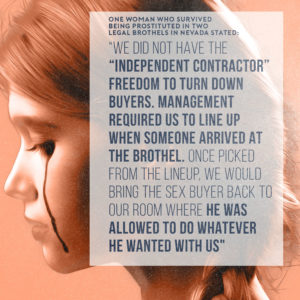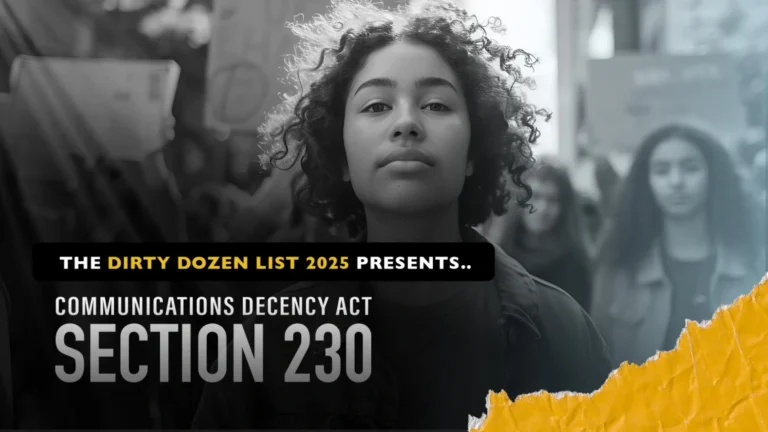Two survivors of sex trafficking in Nevada’s legal system of prostitution are suing the state of Nevada for its laws allowing legalized prostitution. Christen Price, legal counsel for the National Center on Sexual Exploitation Law Center is serving as co-counsel with Jason Guinasso. The case is currently before the 9th Circuit Court of Appeals.
Read more about the legal arguments for this case, the original complaint, and the appeal we filed.
It’s Important To Hold Nevada Responsible For Its Legal Brothels
For 48 years Nevada has allowed legal brothels to exist.
Nevada is the only state in America with legalized brothel prostitution in select counties.
Nevada has the largest commercial sex market in the United States due to the increased demand for buying sex in this normalized atmosphere which abandons many to be exploited via prostitution and sex trafficking. While some may claim that the legalization of prostitution provides better regulation and increased safety, the truth is that sexual violence, racism, and socioeconomic disadvantages are inextricable from the prostitution experience.
This is why Nevada has been placed on the Dirty Dozen List of mainstream facilitators of sexual abuse and exploitation. This why we are suing Nevada.
Legalized Prostitution In Nevada Has Led To A Massive Illegal Sex Industry In The State
One study reported that Nevada’s sex trade (both legal and illegal) is at a minimum 63% higher than the next highest state of New York, and double that of Florida.[1]
Significantly, “although state law allows brothels to operate legally, the vast majority of prostitution continues to occur illegally, beyond the reach of regulations and safeguards intended to improve health and safety. A report by the Center for Disease Control estimated just 10% of individuals providing prostitution work in the legal brothels (Chase, 2012) [emphasis added].”[2]
Why is this the case? In part because “the very requirements and restrictions that are intended to ensure safety and reduce harm raise the operating costs of legal brothels far beyond the minimal overhead costs of illicit operations. Legalized prostitution in Nevada requires paying taxes, fees, and costs incurred to ensure compliance with health and safety regulations. Obtaining and maintaining licenses for both businesses and individual provider/contractors is expensive.”[3]
Similar evidence of how legalized prostitution spurs the growth of an illegal sex trade comes from Australia where a study of prostitution in four Australian states with legalized prostitution systems “found low rates of STIs and human trafficking, and high rates of condom use in licensed brothels (Donovan et al., 2012). But they also found 50% to 90% of the market to operate illegally outside of the regulations presumed to achieve positive results in the legal system, and the unregulated brothels were found to have poor occupational health and safety standards (Donovan et al., 2012; Prostitution Licensing Authority, 2009) [emphasis added].”[4]
Nevada’s Legal Prostitution Policy Fuels Sex Trafficking[5]
Legalized prostitution increases sex trafficking. A 2013 study of 150 countries conducted by the London School of Economics found that wherever prostitution was legal, sex-trafficking tended to increase not decrease.[6]
Why? Because once something is legal, there is increased demand for it.
In the case of prostitution, the decriminalization of sex buying creates a great incentive for pimps/sex traffickers to entice, coerce, or force more people—especially women—into prostitution both inside and outside of legal prostitution frameworks. Demonstrating this reality, an analysis of prostitution advertising in Nevada found that 72% of Nevada’s sex providers have at least some indicator of being young, with the potential of being underage, or working in groups likely to have an active facilitator [emphasis added].[7]
Research has found that more than 1 out of every 10 sex providers in Nevada is too young to buy alcohol, but old enough for johns to purchase them for sex.[8] Many prostituted persons are advertised for their youth regardless of their stated age. “For example, phrases like ‘fresh meat,’ ‘brand new’ and ‘daddy’s little girl’ are all used to connote the youth of those being sold for sex.”[9]
Higher prices are charged for younger women in Nevada. “This demand for youth has serious consequences for trafficking into the sex industry. The higher profit margins create incentives for traffickers to recruit younger individuals.”[10] No school is safe when the demand for sex is high and legal.
Further, an audit of Nevada legal brothels in Lyon County found that 30% of the women had red flags for sex trafficking.[11]
Legal Or Not, It Is Impossible To Disentangle Violence And Exploitation From Prostitution
One woman who survived being prostituted in two legal brothels in Nevada stated:
“We did not have the “independent contractor” freedom to turn down buyers. Management required us to line up when someone arrived at the brothel. Once picked from the lineup, we would bring the sex buyer back to our room where he was allowed to do whatever he wanted with us… The violent-natured men I encountered in legal brothels are no different than the men buying sex on the streets. I cannot count the number of times I physically fought with men in the brothels and how many times I have been raped because I was too scared to fight back.”[12]

According to a number of studies, women are frequently raped in both escort and brothel prostitution.[13]
Women—whether they are inside or outside of the sex trade—are sold, raped, beaten, assaulted, kidnapped and murdered at levels high above the national average. Nevada consistently ranks first in the nation for domestic violence fatalities, third in the nation for rape/sexual assault; fourth in the nation for the women to be murdered by men. [14],[15]
Legalizing prostitution has failed to protect women from sexual exploitation, violence, or psychological trauma.
The largest survey of women in Nevada brothels reports:[16]
- 57% of the women in NV legal brothels interviewed gave all or part of their income to their pimp or trafficker.
- 81% of the women in the Nevada legal brothels reported they wanted to escape prostitution regardless of its legal status. They said it is all (legal/illegal) emotionally the same.
- 23% Self reported they were prostituted as a child.
- 50% have prostituted illegally
- 47% Had pornography made of her in prostitution.
- 47% Had been homeless.
- 44% Was verbally abused in prostitution.
Nevada must be held accountable for the system of harm it has enabled.
Legalized prostitution in Nevada has failed to protect women from sexual exploitation, violence, or psychological trauma.
Instead of legalizing and embracing sexual exploitation, prostitution policies should work to combat demand (by strongly penalizing and reducing sex buyer behavior) and should offer social services and job training opportunities to the women engaged in prostitution to help them exit the industry.
View our webinar explaining the case against Nevada here.
Anyone involved in prostitution can find resources to aid them in exiting the sex trade at www.sextradesurvivorresources.com. If you are seeking civil remedies, get help from the NCOSE Law Center at www.sexualexploitationlawsuits.com.
[1] Creighton University, “Nevada’s Online Commercial Sex Market.” The Human Trafficking Initiative, (2018).
[2] Michael Shively, (2015), “The Negative Effects of Legalized Prostitution in the U.S. State of Nevada,” Women and Human Rights 14 (2018): 74-120, p. 6.
[3] Ibid, p. 7.
[4] Ibid, p. 9.
[5] Seo-Young Cho, Axel Dreher, and Eric Neumayer, “Does legalized prostitution increase human trafficking?” World Development (2013):,41. p. 67-82, doi: 10.1016/j.worlddev.2012.05.023
[6] Ibid
[7] Creighton University, ibid.
[8] Creighton University, “Nevada’s Online Commercial Sex Market.” The Human Trafficking Initiative, (2018).
[9] Creighton University, ibid, p. 13.
[10] Creighton University, ibid, p. 16
[11] Rio Lacanlale, “Audit finds signs of human trafficking at brothels in Nevada county” Review Journal, 2018, https://www.reviewjournal.com/crime/sex-crimes/audit-finds-signs-of-human-trafficking-at-brothels-in-nevada-county/
[12] “Human Trafficking Thrives in Legal Brothels: Charleston.” Reno Gazette-Journal, 9 Oct. 2018, amp.rgj.com/amp/1578611002
[13] Sophie Day and Helen Ward, “Violence towards Female Prostitutes: Violence in Sex Work Extends to More than Risks from Clients,” BMJ Clinical Research 323, no. 7306 (2001): 230.
[14] Rosenblum Law Offices, “Nevada Domestic Violence By the Numbers”, 2018, https://www.rosenblumlawlv.com/blog/2018/3/31/nevada-domestic-violence-by-the-numbers/
[15] Dana Gentry, “Nevada has nation’s 4th highest rate for intimate murder of women” Nevada Current, 2019, https://www.nevadacurrent.com/blog/nevada-has-nations-4th-highest-rate-for-intimate-murder-of-women/
[16] Farley, M. (2007) Prostitution and Trafficking in Nevada: Making the Connections. San Francisco: Prostitution Research & Education. Grant # 2074-61001, Office to Monitor and Combat Trafficking, U.S. State Department.


